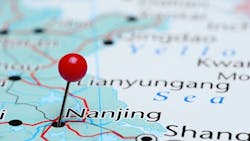China Advances Chip Ambitions with Plan for a $30 Billion Plant
Tsinghua Unigroup Ltd. plans to build a $30 billion memory-chip production complex that will become China’s largest, even as U.S. officials raise concerns about the country’s intention of dominating an industry crucial to the computing and smartphone markets.
The arm of the government-linked Tsinghua group intends to erect a semiconductor complex around an envisioned plant in the eastern city of Nanjing that will have an initial monthly capacity of 100,000 wafers. That will help China “leapfrog development in mainstream storage,” according to a statement carried on the company’s website.
Tsinghua, the investment and technology affiliate of the university attended by Chinese President Xi Jinping, is leading a $150 billion charge to develop a world-class semiconductor industry and reduce the country’s reliance on foreign technology. The U.S. however is concerned that a dominant China could threaten the competitiveness of American players and even national security. Intel Corp., Micron Technology Inc. and Qualcomm Inc. are among the biggest U.S. suppliers of chips to China.
Tsinghua’s plant will mainly make the 3D-NAND and DRAM memory chips used in smartphones, personal computers and other consumer electronics. The surrounding “city” consists of packaging facilities, residences for employees and other support structures, according to the statement. A Unigroup spokesman declined to comment further.
Tsinghua's Ambitious Efforts
It’s difficult to assess the new plant’s impact to the industry because of a lack of detailed information, said Roger Sheng, an analyst at Gartner.
“Unigroup’s expansion may be too fast for an emerging player,” he said.
The latest plan marks one of the more ambitious efforts unveiled to date by Tsinghua, which plans to embark on a global acquisition spree. It’s completed a spate of high-profile acquisitions in recent years through units such as Unigroup and Tsinghua Tongfang Co., including of RDA Microelectronics Inc. and Spreadtrum Communications Inc.
But its efforts have encountered foreign resistance of late. It withdrew from a $3.8 billion investment in Western Digital Corp. in the face of a U.S. security review, and a potential $23 billion bid for Micron didn’t materialize last year. In Taiwan, Unigroup and Powertech Technology Inc. said on Jan. 13 they will terminate a share-purchase agreement after failing to win government approval. In November, its planned investment in ChipMOS Technologies Inc. was also scrapped.
Wilbur Ross, President-elect Donald Trump’s nominee for commerce secretary, told a confirmation hearing Thursday he was “very, very concerned” about China’s ambitions in semiconductors.
“The Chinese are the world’s largest consumer of semiconductors, so far are mainly importing it a lot from here. And semiconductors are a basic building block,” Ross said.
By Bloomberg News
About the Author
Bloomberg
Licensed content from Bloomberg, copyright 2016.
